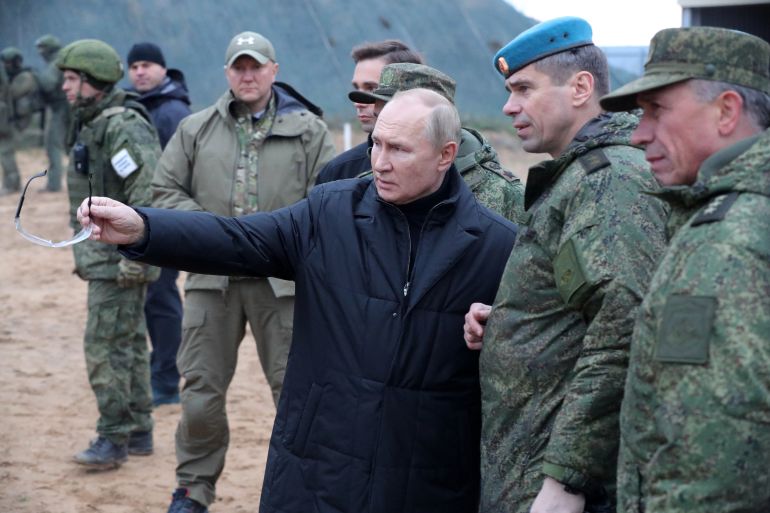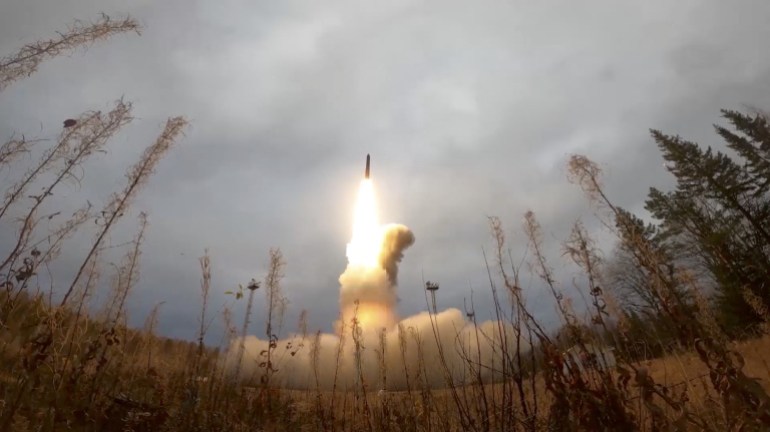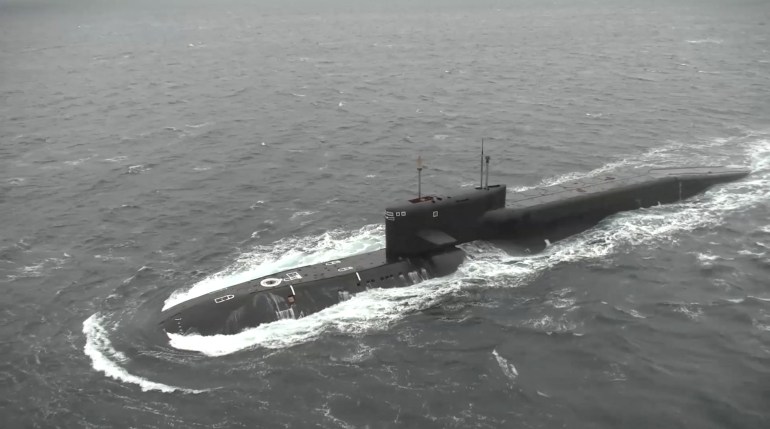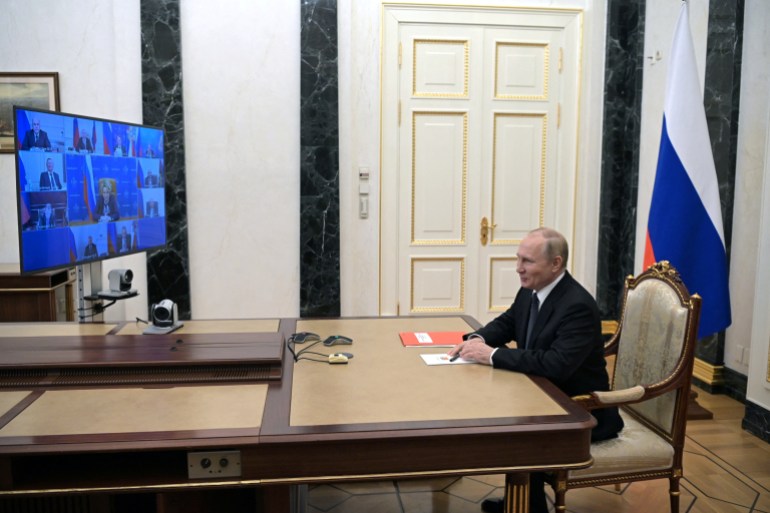Will Russia’s Vladimir Putin go nuclear?
The Take looks into the likelihood of Russia using nuclear weapons.

With Vladimir Putin’s recent warning that Russia will use “all available means” at his disposal to defend his country, there has been increased chatter about the Russian president going to use nuclear weapons. But just how likely is that, and what does it mean to start a nuclear war in 2022?
Keep reading
list of 4 itemsRevisiting the hidden US war in Somalia
Did police cause Indonesia’s football stadium disaster?
Why Burkina Faso just had its second coup in 8 months
In this episode:
- Alex Gatopoulos (@alexgatopoulos), Al Jazeera defence editor
- Gerhard Mangott (@gerhard_mangott), professor of international relations, University of Innsbruck
Connect with us:
@AJEPodcasts on Twitter, Instagram, and Facebook
Full episode transcript:
This transcript was created using AI. It has been reviewed by humans, but it might contain errors. Please let us know if you have any corrections or questions. Our email is TheTake@aljazeera.net.
[NAGASAKI BOMBING]
Halla Mohieddeen: That’s the sound of a nuclear bomb – specifically the last time one was ever used in warfare, when the US dropped the bomb on Nagasaki in 1945. But as Russia’s war in Ukraine continues, many are concerned that Russia might become the first country to use a nuclear weapon on another in almost 80 years.
Newsreel: President Biden warning the risk of nuclear armageddon has not been this high since the Cuban Missile Crisis.
Newsreel: The US is developing contingency plans for possible Russian escalation in its war in Ukraine, including the potential use of tactical nuclear weapons.
Mohieddeen: The Russian president, Vladimir Putin, hasn’t done much to lessen the chatter.
Vladimir Putin: If the territorial integrity of our country is threatened, we will, without question, use all the means at our disposal to protect Russia and our people. This is not a bluff.
Mohieddeen: But just how likely is it that Putin would actually go nuclear? And what exactly would this look like? I’m Halla Mohieddeen, and this is The Take.
[THEME MUSIC PLAYING]
Mohieddeen: Today, I’m talking to someone who’s been covering the tactical aspects of Russia’s war in Ukraine since it began earlier this year.
Alex Gatopoulos: My name’s Alex Gatopoulos. I’m a news editor at Al Jazeera English TV. I have a specialisation in defence and I am Al Jazeera’s de facto defence editor.
Mohieddeen: With all the talk about Putin potentially going nuclear – with even US President Joe Biden warning of armageddon, I wanted to get a sense from Alex, just how serious Putin’s threats have been.
Gatopoulos: He’s reminded the world several times that Russia has a nuclear arsenal, that Russia is not bluffing, that he’s not bluffing, and that he would be willing to use them to defend Russian soil.

[MUSIC PLAYING]
Mohieddeen: Before going further, let’s break down the different types of nuclear weapons that exist … because it can get a little confusing sometimes.
Gatopoulos: The battlefield ones are the small ones. They’re the tactical ones. They’re used against troop concentrations or an airfield or say, a fleet or a port or something like that. A single specific target.
Mohieddeen: Some also call them sub-strategic nuclear weapons, and they can be small enough to fit into a suitcase … in contrast, of course, to the strategic nukes. They’re a bit bigger…
Gatopoulos: The strategic ones are the ones that will be delivered by long-range missiles or launched from nuclear submarines, and these are the hydrogen bombs.
Mohieddeen: OK. And they’re the ones that they can’t really test because they would kill everyone even through testing them.
Gatopoulos: That’s exactly right.
[MUSIC PLAYING]
Mohieddeen: Those aren’t the bombs people believe Putin might use … at least not to start with. But even the smaller, tactical nuclear weapons – the ones people fear he might soon use – can still be extremely destructive.
Gatopoulos: Tactical nuclear weapons have a certain yield. We’re talking roughly the size of the weapons that destroyed Hiroshima and Nagasaki, perhaps twice as powerful. That sort of levels from a fraction of a kilotonne to 50 kilotonnes. The one that destroyed Hiroshima was roughly 15, so that would be 15,000 tonnes of TNT.
Newsreel: Beneath that sinister pall of smoke, the world’s most destructive force has been unleashed with what results we know only too well.
Gatopoulos: But of course, it’s not just the blast that causes the destruction. You’re talking about a flash of radiation, which will probably kill anybody exposed to it within the year. You’re talking about fallout, which is the irradiated byproducts of the blast, the mushroom cloud that’s normally a ground burst, which is particularly dirty. It gathers up all that soil and organic matter and pumps it into the air and it’s all massively radioactive, and this falls down over an area. If you think like Chornobyl…
Newsreel: One of the atomic reactors at the Chornobyl atomic power plant near the city of Kyiv was damaged.
Newsreel: Many thousands of people live in the vicinity.
Newsreel: Perhaps the worst accident in the short history of the world’s nuclear power industry.
Gatopoulos: Now, Chornobyl happened in the 1980s and it’s still now a no-go zone.
Newsreel: Once you go through here, the area is contaminated.
Newsreel: 30 years later, Chornobyl’s crippled reactor, still has the power to kill.
[MUSIC PLAYING]
Gatopoulos: So that gives you an idea of how long-term the effects of radiation are. They’re horrendous weapons. That’s just the battlefield stuff. Hydrogen weapons use an atomic blast as just the trigger for an immensely more powerful explosion called a fission-fusion bomb – and that is like creating a mini sun, effectively, we’re talking millions of degrees centigrade, greater destruction as well. One hydrogen bomb would destroy Greater London or Greater New York.
Mohieddeen: And what Alex says is most concerning, is that though Putin would never start with a strategic, hydrogen bomb – once you use a nuclear bomb of any kind – it could up the ante and quickly spiral out of control.
Gatopoulos: The important thing is to remember, it’s not the battlefield nuclear weapons that everybody’s worried about. It’s the acceleration. It is the escalation to uncontrolled nuclear weapons use where you’re not just destroying a nearby airfield or a nearby troop concentration, you’re attacking cities and you’re destroying countries, and that is what everybody’s worried about. These things are not weapons in themselves. They are a very, very steep, slippery slope towards complete destruction of humanity. And it doesn’t take too many of them. Again, by the way, advanced global warming studies have been applied, like computer models to what would be a minor nuclear conflict. And they used the example of India and Pakistan where there would be, say, 50 nuclear weapons exchanged or warheads exchanged, that alone would trigger a global nuclear winter where harvest would fail for about a decade, leading to global famine. So the stakes are pretty high. We already have global warming impacting harvests at the moment. So anything like this, adding to it would be utterly catastrophic. And you’re talking about most of the people who would die, wouldn’t die from radiation, wouldn’t die from the nuclear blast itself, but would die of hunger about six months to a year later.
Mohieddeen: Because the ash from this cloud would block out the sun.
Gatopoulos: Exactly so.
Mohieddeen: So that’s what you mean by nuclear winter.
Gatopoulos: Yes, very much so.

[MUSIC PLAYING]
Mohieddeen: It’s weird you used the term minor nuclear conflict because any nuclear conflict doesn’t seem particularly minor when you think of the images, the mushroom clouds of Hiroshima and so on. Can you just unpack for us what Putin using nuclear weapons would mean?
Gatopoulos: I think there are several scenarios that would be likely if he was painted into a corner. The first one is that he attacks a legitimate military target on Ukrainian soil that would, say, be a troop concentration or an armoured formation or something of that level. He wants to keep the casualty level as low as possible. Because he doesn’t want to invite a NATO response. Now, the second option is a detonation, which wouldn’t be the mushroom cloud over a city or over the countryside even. It would be a detonation, say, over the Black Sea. That would remind everyone that Russia does have these weapons, that it may have been defeated conventionally, but it still has this massive reserve. The third scenario, which struck me as, the most likely, would be a test on Russian soil, on an old, say, an ex-Soviet nuclear test site, like Novaya Zemlya up in the extreme north of Russia where they used to test the weapons.
And just to remind everyone again that he has these weapons, be advised as to the power of them and the danger of them. And for everybody just to take a deep breath and calm down and allow him to retreat? He can’t use these weapons to win. The only way he could use them is to make sure that his forces aren’t routed and that Russia proper isn’t attacked.
Mohieddeen: So, if Putin can’t win with nuclear weapons, what are the chances he’ll actually use them? More on that after the break.
Mohieddeen: Gerhard Mangott is an international relations professor at the University of Innsbruck in Austria. He specialises in the post-Soviet region and nuclear proliferation. And since he’s someone who has studied Vladimir Putin closely, I asked Gerhard how likely he thinks the Russian president’s threat to use “all available means” at his disposal might mean the use of nuclear weapons.

[MUSIC PLAYING]
Gerhard Mangott: This is not an explicit nuclear threat, but it’s implicit and everybody, of course, understands what Putin was, referring to. And Putin, of course wanted to make this reference in order to achieve one of the objectives of this, namely to scare the Western publics, and to make Western governments change their position on Ukraine. I don’t think he will achieve that, but that’s one of his intentions. It’s also a warning to Kyiv that Russia is well-prepared and ready to use tactical nuclear weapons if Russia is suffering a serious defeat on the battlefield. So I don’t see any likelihood that nuclear weapons will be used now, not even when the Russian forces have to withdraw from Kherson, as they have indicated they will.
Newsreel: The Russian army is preparing to evacuate civilians from the city of Kherson.
Newsreel: Russia’s faced a series of setbacks in recent weeks and in a rare admission its new commander in Ukraine says the situation in Kherson tense.
Mangott: But if Russia suffers a serious defeat, meaning losing the territory of all four regions, and possibly even facing a threat to the Crimea, then I think it is likely, of course not definite, but it’s likely that Putin will resort to tactical nuclear weapons because Putin cannot afford to lose this war. Putin must win this war. If he loses the war, he will lose his job.
Mohieddeen: To Alex, Putin going nuclear would also be an act of desperation, to project the idea that Russia is still a global power.
Gatopoulos: He could rely on a nuclear weapon to remind everyone just how powerful Russia is as a country and that it can suffer a defeat – but don’t take that defeat too far. He’s already losing. Now if he loses completely and say, Russian forces are routed, and they start streaming across the Ukrainian-Russian border. That will be the most dangerous time when there could very well be the possibility of nuclear weapons used by Putin.
Mohieddeen: So this would be his way of reasserting himself. The only option to show that Russia still has might.
Gatopoulos: Exactly so. That’s exactly right.
Mohieddeen: And what do you think the response of other nuclear powers would be if Putin did launch a nuclear weapon? I mean, have NATO countries calculated what they would do?
Gatopoulos: I think you either retaliate massively conventionally – massive air strike, massive missile strikes, possibly armed intervention on the ground. So you have that element which would destroy every single Russian troop concentration or military unit, without having to resort to nuclear weapons. Or you go the nuclear option. And use battlefield nuclear weapons to achieve the exact same objective – the destruction of the Russian military. And they’ve outlined this, not using the word nuclear, but they’ve outlined that the response would be massive and would be immediate.
Mohieddeen: So what do you think the most likely response would be?
Gatopoulos: You know, you always want to think that cooler heads will prevail and that we would take a breath and a moment there. Any nuclear strike by Russia on Ukrainian soil would be responded to by NATO directly, in my view, and the response would be the comprehensive destruction of all Russian military units and concentrations in the west.
Mohieddeen: Right.
Gatopoulos: Where that leads to, after that, is anybody’s guess because that’s a big jump up the escalator ladder, but I think that’s what they would do because in a sense you have to. Because otherwise what’s stopping Russia from using more than one? You know, “they let off one, nobody did a thing. Oh great, well we can let off maybe 10. Maybe we do destroy Kyiv. Maybe we do destroy Lviv.”
[MUSIC PLAYING]
Mohieddeen: But with all the talk of destruction, Gerhard says the international community has been meeting and planning for a situation like this.
Newsreel: NATO has begun its regular nuclear deterrent drills in Western Europe. As tension saw between Russia and the West.
Newsreel: NATO defence ministers meanwhile are meeting for a second day in Brussels. The focus is on Vladimir Putin’s big threats to use nuclear weapons.
Mangott: I think the West and the United States, particularly, is well prepared for the use of such a technical nuclear weapon because the West has always seen Russia’s military doctrine as a doctrine, which allows the use of sub-strategic nuclear weapons in case of a massive conventional attack on the territory of the Russian Federation. And, of course, NATO and the United States had the need to decide which response the West would give in such a circumstance. We also had a meeting of the NATO nuclear planning group last week that was debated between the defence ministers again. So I do think, yes, the West is well-prepared.
Mohieddeen: That level of preparation leads Gerhard to believe that the kind of armageddon scenario warned of by US President Joe Biden, is in fact, highly unlikely.
Mangott: I think it wasn’t helpful to hear from Biden that the fact of nuclear armageddon is actually on the table, because it isn’t. And, if he talks about something which actually is not likely to happen – very unlikely to happen – he creates even more fear among western populations. He should not have said this. However, the United States government has communicated to the Russian government about serious and even horrific consequences if Russia makes use of tactical nuclear weapons. But the most likely way to respond by the West, by the United States, is not by detonating a nuclear weapon – a tactical one – but to launch a conventional strike against the Russian army positions in Ukraine.
Mohieddeen: For Gerhard, it ultimately comes down to the debate over whether Putin is a rational actor. Something that has, at times, been called into question.
Newsreel: Evaluating Vladimir Putin’s state of mind, a top priority now.
Newsreel: Has Putin gone crazy? Is he losing his grip on his sanity?
Mohieddeen: Gerhard, though, has a more sober take.

[MUSIC PLAYING]
Mangott: According to my assessment, an all-out global, thermonuclear war is very unlikely. Putin is a rational actor and I think he’s reasonable enough not to escalate. Even if he receives a very powerful response from the United States after having used a nuclear weapon, I consider it very unlikely that he will resort to intercontinental missiles and strategic nuclear warheads with a very high impact. He actually doesn’t want to risk the existence of his own society and actually the existence of mankind.
Mohieddeen: Alex has been thinking about how this ends too. Can you see a scenario where he says, “well, if I can’t win, no one wins”. And would then trigger this armageddon scenario. Is that a possibility?
Gatopoulos: I mean, you never know with the future, but I think it’s highly, highly unlikely. It’s a strange thing that we always say this about our enemy, that they are irrational and they don’t value human life like we do. We’ve always said this about our enemies, whoever they happen to be. But everybody gets very, very thoughtful and rational when it comes to the nuclear weapons use. Because no one’s gonna win with armageddon. There’ll be no Russia left. There’ll be nothing. The Russians will cease to exist as a people. Same thing with the United States and all of Europe, by the way. So I can’t see anybody wanting that. Because that seems to me like defeat.
Mohieddeen: But if you’re staring at defeat anyway, I mean, Vladimir Putin is staring at defeat. It’s difficult to see how he comes out of this with his presidency intact. And so, It’s plausible, isn’t it? That he says, well, look, jigs up for me, so gonna take everyone else down with me.
Gatopoulos: I think it’s highly, highly unlikely, and I think it’s probably the least likely of the nuclear weapons use scenarios. He invaded another country. Sure – he’s lost. But I can’t see him bringing the house down upon his head, unless Moscow was being attacked, or something of that nature, which obviously triggers a whole load of other things. Biden himself came out and was very clear that, you know, Putin may have miscalculated, but he is a rational person and surrounded by rational people. Now, that’s, not the comfort that it perhaps could be, but it’s something. That he’s not a madman. He’s not going to burn the world. He’s not going to trash it. But he will defend himself, and he will defend his political survival, and he will defend Russia itself.
Episode credits:
This episode was produced by Ashish Malhotra (lead producer) with Chloe K Li, Ruby Zaman, Negin Owliaei, Amy Walters, Alexandra Locke, and our host, Halla Mohieddeen. Ruby Zaman fact-checked this episode.
Our production team includes Chloe K Li, Alexandra Locke, Ashish Malhotra, Negin Owliaei, Amy Walters, and Ruby Zaman. Our sound designer is Alex Roldan. Tim St Clair mixed this episode. Aya Elmileik and Adam Abou-Gad are our engagement producers. Ney Alvarez is Al Jazeera’s head of audio.